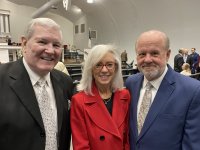The Fort Worth Star Telegram article of February 21, 2022 asked the question,
"Created for mobs and the mafia, could this law apply in a church sexual abuse case?"
As of March 4, 2022, the United States Court of Appeals decided that the answer to that question was
"NO" - at least not in this particular case - Joy Ryder's complaint against David Hyles, Hyles-Anderson College, and First Baptist Church of Hammond was dismissed by the court:
"Here, the complaint focuses entirely on allegations of personal injury—horrific allegations by any measure. The nature of the alleged personal injuries does not, however, transform them into injuries to any business or property. . . .Ryder and Lee contend that the Enterprise misappropriated their funds by using them to fund a sham investigation in the 2010s. But nowhere does their complaint describe how tithes or tuition paid in the 1970s could plausibly have been used to fund a phony investigation decades later. So here Ryder and Lee’s allegations are too 'speculative and amorphous' to permit their RICO claim to proceed. . . .What is alleged here is tragic beyond words. But we are constrained by the limitations Congress established in § 1964(c). Because Ryder and Lee have not plausibly alleged any injury to business or property within the meaning of the statute, we are left to AFFIRM AS MODIFIED."
http://media.ca7.uscourts.gov/cgi-b.../C:21-2590:J:Scudder:aut:T:fnOp:N:2841919:S:0
The decision stated that
"The requirement that civil RICO plaintiffs allege an injury to 'business or property' serves to preclude recovery for personal injuries and the pecuniary losses incurred therefrom. . . . when the alleged injuries 'are plainly derivative' of personal injuries, they 'reflect personal injuries which are not compensable under RICO.'”


